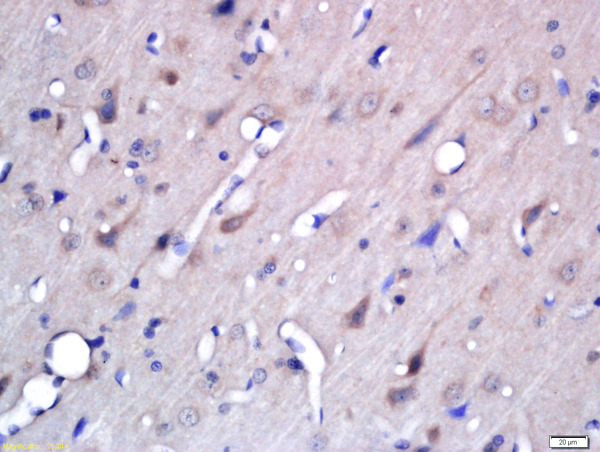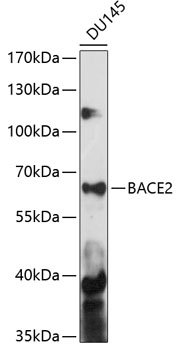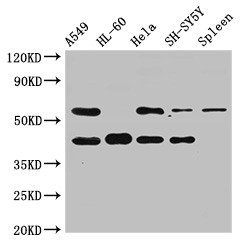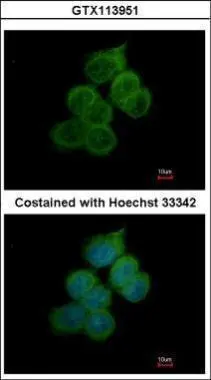
Immunofluorescence analysis of methanol-fixed A431, using BACE2(GTX113951) antibody at 1:500 dilution.
BACE2 antibody [C1C3]
GTX113951
ApplicationsImmunoFluorescence, Western Blot, ImmunoCytoChemistry, ImmunoHistoChemistry, ImmunoHistoChemistry Paraffin
Product group Antibodies
ReactivityHuman, Mouse, Rat
TargetBACE2
Overview
- SupplierGeneTex
- Product NameBACE2 antibody [C1C3]
- Delivery Days Customer9
- Application Supplier NoteWB: 1:500-1:3000. ICC/IF: 1:100-1:1000. IHC-P: 1:100-1:1000. *Optimal dilutions/concentrations should be determined by the researcher.Not tested in other applications.
- ApplicationsImmunoFluorescence, Western Blot, ImmunoCytoChemistry, ImmunoHistoChemistry, ImmunoHistoChemistry Paraffin
- CertificationResearch Use Only
- ClonalityPolyclonal
- Concentration0.83 mg/ml
- ConjugateUnconjugated
- Gene ID25825
- Target nameBACE2
- Target descriptionbeta-secretase 2
- Target synonymsAEPLC, ALP56, ASP1, ASP21, BAE2, CDA13, CEAP1, DRAP, beta-secretase 2, 56 kDa aspartic-like protease, Down syndrome region aspartic protease, SLCO3A1/BACE2 fusion, aspartyl protease 1, beta-site APP-cleaving enzyme 2, beta-site amyloid beta A4 precursor protein-cleaving enzyme 2, memapsin-1, membrane-associated aspartic protease 1, theta-secretase, transmembrane aspartic proteinase Asp1
- HostRabbit
- IsotypeIgG
- Protein IDQ9Y5Z0
- Protein NameBeta-secretase 2
- Scientific DescriptionCerebral deposition of amyloid beta peptide is an early and critical feature of Alzheimers disease and a frequent complication of Down syndrome. Amyloid beta peptide is generated by proteolytic cleavage of amyloid precursor protein by 2 proteases, one of which is the protein encoded by this gene. This gene localizes to the Down critical region of chromosome 21. The encoded protein, a member of the peptidase A1 protein family, is a type I integral membrane glycoprotein and aspartic protease. Three transcript variants encoding different isoforms have been described for this gene. [provided by RefSeq]
- ReactivityHuman, Mouse, Rat
- Storage Instruction-20°C or -80°C,2°C to 8°C
- UNSPSC12352203
References
- Ren J, Zhang S, Wang X, et al. MEF2C ameliorates learning, memory, and molecular pathological changes in Alzheimer’s disease in vivo and in vitro. Acta Biochim Biophys Sin (Shanghai). 2022,54(1):77-90. doi: 10.3724/abbs.2021012Read this paper
- Zhao L, Xiao Y, Xiu J, et al. Protection against the Neurotoxic Effects of β-Amyloid Peptide on Cultured Neuronal Cells by Lovastatin Involves Elevated Expression of α7 Nicotinic Acetylcholine Receptors and Activating Phosphorylation of Protein Kinases. Am J Pathol. 2018,188(4):1081-1093. doi: 10.1016/j.ajpath.2017.11.020Read this paper

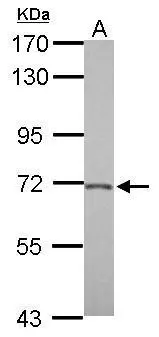
![BACE2 antibody [C1C3] detects BACE2 protein at cytoplasm in Rat brain by immunohistochemical analysis. Sample: Paraffin-embedded Rat brain. BACE2 antibody [C1C3] (GTX113951) diluted at 1:500.
Antigen Retrieval: Citrate buffer, pH 6.0, 15 min BACE2 antibody [C1C3] detects BACE2 protein at cytoplasm in Rat brain by immunohistochemical analysis. Sample: Paraffin-embedded Rat brain. BACE2 antibody [C1C3] (GTX113951) diluted at 1:500.
Antigen Retrieval: Citrate buffer, pH 6.0, 15 min](https://www.genetex.com/upload/website/prouct_img/normal/GTX113951/GTX113951_40485_20160106_IHC-P_R_w_23060501_383.webp)
![BACE2 antibody [C1C3] detects BACE2 protein at cytosol on rat fore brain by immunohistochemical analysis. Sample: Paraffin-embedded rat fore brain. BACE2 antibody [C1C3] (GTX113951) dilution: 1:500.
Antigen Retrieval: Trilogy? (EDTA based, pH 8.0) buffer, 15min BACE2 antibody [C1C3] detects BACE2 protein at cytosol on rat fore brain by immunohistochemical analysis. Sample: Paraffin-embedded rat fore brain. BACE2 antibody [C1C3] (GTX113951) dilution: 1:500.
Antigen Retrieval: Trilogy? (EDTA based, pH 8.0) buffer, 15min](https://www.genetex.com/upload/website/prouct_img/normal/GTX113951/GTX113951_40485_IHC_R_w_23060501_986.webp)
![BACE2 antibody [C1C3] detects BACE2 protein at cytosol on human breast carcinoma by immunohistochemical analysis. Sample: Paraffin-embedded human breast carcinoma. BACE2 antibody [C1C3] (GTX113951) dilution: 1:500.
Antigen Retrieval: Trilogy? (EDTA based, pH 8.0) buffer, 15min BACE2 antibody [C1C3] detects BACE2 protein at cytosol on human breast carcinoma by immunohistochemical analysis. Sample: Paraffin-embedded human breast carcinoma. BACE2 antibody [C1C3] (GTX113951) dilution: 1:500.
Antigen Retrieval: Trilogy? (EDTA based, pH 8.0) buffer, 15min](https://www.genetex.com/upload/website/prouct_img/normal/GTX113951/GTX113951_40485_IHC_w_23060501_485.webp)

